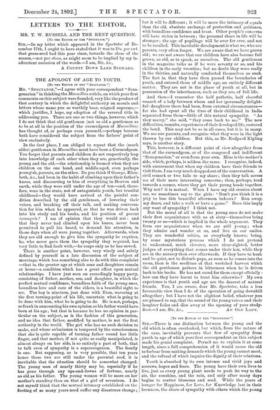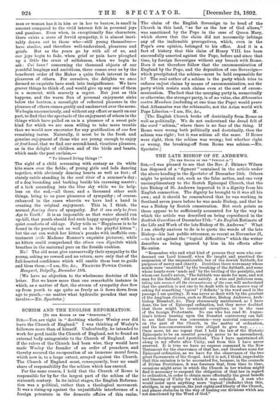[To THE EDITOR OF THE "SPECTATOR."] SIR,—There is one distinction
between the young and the old which is often overlooked, but which, from the nature of the case, inevitably prevents that flow of sympathy from youth to age of which your first correspondent on this subject made his genial complaint. Permit me to explain it at some length, since a full comprehension of it would cause the old to forbear from making demands which the young cannot meet, and the refusal of which impairs the dignity of their relations.
Youth is absorbed by its own intense and vivid joys and sorrows, hopes and fears. The young have their own lives to live, just as every young plant needs to push its way to the air, the sunshine, and the rain, and only after many days begins to scatter blossoms and seed. While the years of hunger for Happiness, for Love, for Knowledge last in their keenness, the share of sympathy with others which the young man or woman has it in him or in her to bestow, is small in amount compared to the vivid interest felt in personal joys and passions. Even when, in exceptionally fine characters, there exists a store of fervid sympathy, it is almost inevi- tably drawn out to those who—still young themselves— have similar, and therefore well-understood, pleasures and griefs. But as the years go by with all of us, and our joys begin to fade, when grief or pain have ploughed up a little the crust of selfishness, when we begin to ask : Cui bone? concerning the thousand objects of our youthful longings and ambitions, there comes over us by the beneficent order of the Maker a quite fresh interest in the pleasures of others. For ourselves, the delights we once deemed so exquisite have sunk into insignificance. We have graver things to think of, and would give up any one of them in a moment, with scarcely a regret. But just as this happens, and the warm Sun of personal enjoyment sinks below the horizon, a moonlight of reflected pleasure in the pleasure of others comes gently and unobserved over the scene. We begin unconsciously, and without any effort or merit on our part, to find that the spectacle of the enjoyment of others in the things which have palled on us is a pleasure of a sweet pale kind for which we are soon willing to take more trouble than we would now encounter for any gratification of our few remaining tastes. Naturally, it must be in the fresh and genuine enjoyment of those who are young enough to enjoy at first hand, that we find our second-hand, vicarious pleasure, as in the delight of children and of the birds and beasts, which made the poet exclaim,—
" Ye blessed living things !"
The sight of a child screaming with ecstasy as its white kite soars over the fields ; of young girls and lads dancing together, with obviously dancing hearts as well as feet ; of stately cattle standing in the cool river of a summer's day ; of a dog bounding and barking beside his caressing master ; of a lark ascending into the blue sky while we lie help- less on the sod,—all these, and a thousand other such things, bring to us pure pleasures of sympathy ; of course, enhanced in the cases wherein we have had a hand in creating the original enjoyment. This is, I think, the normal flowing down of sympathy. But it can only be from Age to Youth ! It is as impossible as that water should run up-hill, that youth should feel such happy sympathy with the quiet comforts of old age. Paley tells us "Happiness is to be found in the purring cat as well as in the playful kitten "; but the cat can watch her kitten's pranks with ineffable con- tentment (vide Madame Ronner's exquisite pictures), while no kitten could comprehend the otiunt, cum dignitate which breathes in the maternal purr on the fireside cushion.
No! The old must give unreservedly their sympathy to the young, asking no reward and no return, save only that of the full-hearted confidence which will enable them best to guide and bless them.—I am, Sir, dm, FRANCES POWER COMM.
Hengwrt, Dolgelly, December 19th.
[We have no objection to the wholesome doctrine of this letter. Bat we know more than one remarkable instance in which, as a matter of fact, the stream of sympathy does flow up from youth to age quite as freely as it flows down from age to youth,—no matter what hydraulic paradox that may involve.—En. Spectator.]



































 Previous page
Previous page